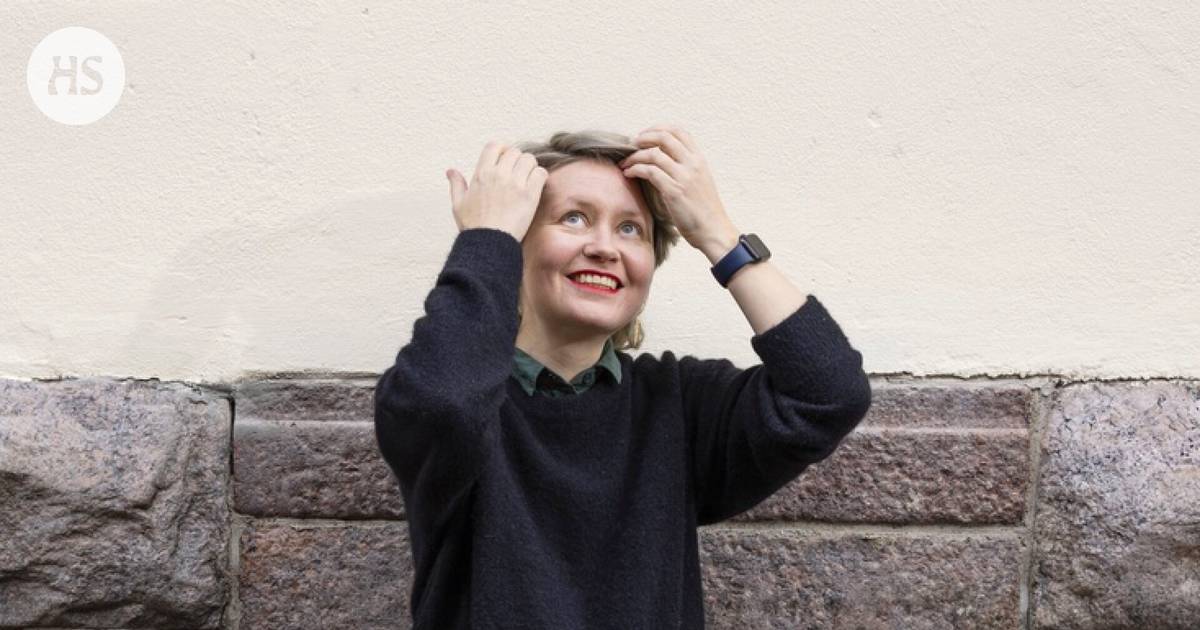For the best of the year has won the Helsingin Sanomat award for a debut novel Susanna Hast with a novel Body/roomt (S&S).
“In the work, personal experience is based on extensive social, literary and philosophical material,” the justification states.
“Against this background, it becomes clear that the story is not about the sacrifice of one person, but about a subjugating and violent structure that doesn’t seem to change at all, even if the level of civilization rises.”
Born in Sweden, Susanna Hast, 41, spent her childhood in Rovaniemi and now lives in Helsinki. He is a doctor of social sciences and a docent of artistic research.
The first ones the entries on the way to the novel were created on Hasti’s phone more than four years ago during a summer vacation in France.
“I studied there Saara Turunen A bystander and I thought, aha, you can write about yourself in this way,” says Hast. “Furthermore, something special had happened during the vacation that I wanted to write down. And when I had tapped it on my phone, other things started to emerge.”
So there are two birth paths for the first child: writing about oneself and violence experienced at a very young age.
“It became obvious that it is precisely from that combination that I have to write and limit my work to the experience of violence,” characterizes Hast.
The novel’s tension arises from the fact that the central character simultaneously remembers too little and far too much about experiences that no one should have.
In order for the past to be processed and for him to understand his own, sometimes incomprehensible behavior, he must return to the rooms where the evil happened. Places tell.
“
“There is nothing invented.”
Definitions in his fugitive work, Hast uses the term autotheoretical – to distinguish it from autofiction.
“Because I have such a clear spirit of searching for the truth, and there is nothing made up.”
A lyrical essay, which is a mix of autobiographical prose, essay and poem, could also be suitable, according to him.
“I think that Body/rooms is also true crime,” Hast laughs.
His readers are not laughed at. After all, it is about the sexual abuse of a child and the resulting serious traumas in adulthood.
“I have a dark sense of humor,” explains Hast. “You can’t talk about these kinds of things, let alone write, if you don’t involve thick humor.”
Rather than brave Body/rooms is necessary.
“Yes, you can call me brave. But that word carries with it an echo of something that it would make more sense to be non-brave after all. That it’s a bit daring and crazy when you dare to tell something that most people would never tell. Self destructive.”
Hast prefers what is necessary. It’s more political. Stronger. And it refers to moving forward, even if there are imprints left.
The harshest of definitions would be a revelation book.
“It allows you to be horrified and peek into someone else’s experience, and it doesn’t require anything from the reader himself. I tried to avoid disclosure by saying that Body/rooms would bother the recipient.”
“Writing scientific texts is not as fun as writing fiction,” says Susanna Hast. “I’ve started to think that artistic freedom can take you much closer to the truth.”
According to reader feedback, that’s what happened: many started to deal with their own issues of anxiety.
That’s exactly how disturbing literature should have an effect, not draw attention to the personality and personalities of the author.
You can easily skip the peeking literature and immediately move on to the next item, and you don’t have to think at all about what you just read.
Hast is looking for a point of comparison for his book Iidan Rauma from a novel about school bullying that came out in January Destruction.
“When I just think about Iida’s book, I immediately feel a little out of breath. My book can also make me feel a little tormented and anxious.”
“
“I have a dark sense of humor.”
Writing it however, it was liberating, great and fun.
Wasn’t dealing with a delicate topic intimidating?
“Yes. Doubted and scared many times. Perhaps the biggest concern was the fear of being exposed. It made it easier when I saw my writing becoming a work. In the Finnish literature discussion, it seems to be forgotten that even in so-called confessional literature, the issue is a work of art, not any diaries.”
Hast talks about distancing and strangeness, which detach his book from the description of his own life.
“I don’t even talk like the central character of my book does.”
It was important for him to write his own experience as part of history.
“My personal experience is not terribly interesting. What is interesting is what in this world makes it possible for it to happen as it happened to me.”
At least to that extent, he feels that he has succeeded, that the readers are not interested in him as a person. And nothing terrible has happened with the book, let alone something bad.
Susanna Hastin the novel hits us all. Even though we know the criminal things that happen to far too many children, we prefer not to think about it because it makes it easier for us to lull ourselves into our everyday lives.
And that’s why sexual abuse continues.
“Body/rooms makes the invisible visible”, is praised in the justification of the award. “At the same time, it shows that you can get rid of the feeling of guilt. As well as the fact that violence is never the object’s cause.”
According to Hasti, he lacks an episodic memory that would explain cause and effect. Thus, understanding the whole is difficult for him to say the least.
“I only remember flashes. Sometimes the memory disappears and suddenly comes back.”
He is satisfied with that, that he didn’t even try to write a happy ending to his novel.
“Because there is no such thing. That is an important testimony of my book.”
Although the text ends, Body/rooms to be continued.
What a writer Would you say northern settlement to young Susanna?
During the first interview, you have to wait a bit for the answer.
“It’s quite hard to imagine that young Susanna. He seems like a complete stranger to me now.”
“Perhaps I would comfort. I would tell him you won’t believe how well things are going to turn out. There are many more talents hidden in a person than what he can see and understand himself.”
Literature
The prize was awarded for the 28th time
-
The Helsingin Sanomat literary award, 15,000 euros, continues the tradition of the J. H. Erko first book award, awarded between 1964 and 1994.
-
The jury included journalists Summer Ahola, Arla Kanerva, Susanna Laari and Antti Majander (president) and author Eino Santanen and recognition last year with a novel Yours, Margot won Meri Valkama.
-
In total, more than 80 debuts written in Finnish came to the attention of the jury. Based on the harvest, it can be said that the violent personality is no longer an anomaly in fiction, but even the mainstream. At the same time, the entire novel genre is moving away from autobiographical and confessional towards essay, documentary and academic research.
-
Honorable mention was given by the jury To Elina Airio31. His linguistically rich novel A woman is running in the forest (Gummerus) chillingly shows a society where social work has been privatized and intensified.
Read more: Susanna Hast was a victim of sexual violence as a child and forgot the whole thing for years: Now she understands why the violence so often repeats itself
Read more: Susanna Hasti’s novel does not bother to describe sexual violence in detail, even though it is at the heart of the work
Read more: Who will receive Helsingin Sanomat’s first prize? They are the winning candidates
#Books #Susanna #Hast #won #literature #prize #winning #shows #violence #society

/https://content.production.cdn.art19.com/images/6e/20/75/47/6e207547-4ad6-4811-b8f0-3c7b7a3edb51/0b845a2013df296da2e006375909e160f8cc4c964755dc820563b9006df775)







